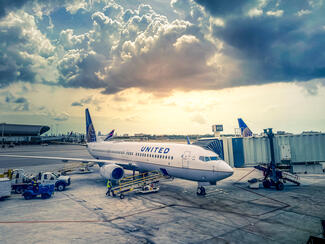United Airlines has found installation defects in the door plugs of its Boeing 737 MAX 9 jets, including loose bolts. This discovery comes after United grounded its MAX 9 fleet following a decompression accident aboard an Alaska Airlines flight, which involved a door plug being blown away from the aircraft body during ascent.
The Air Current first reported the issue before United's confirmation, highlighting the significant implications for Boeing and its fuselage supplier, Spirit AeroSystems. At least five United aircraft were found with these defects. Alaska Airlines, another major operator of the aircraft subtype, had not begun inspecting its grounded MAX 9 aircraft at the time of the report.
The Federal Aviation Administration (FAA) ordered the grounding of some 737 MAX 9 aircraft pending inspection. This directive affects about 171 aircraft globally, out of approximately 215 in service. The grounding was initiated after Alaska Airlines flight AS 1282 experienced cabin depressurization, with the left aft-wing "door plug" being blown out during the jet's departure climb.
The force of the decompression was strong enough to pull smartphones from passengers' hands, open the cockpit door, and dislodge the pilots' headsets, as described by National Transportation Safety Board (NTSB) chair Jennifer Homendy. Flight attendants managed to secure the cabin, and the pilots safely returned the aircraft to Portland. There were no major injuries among the 171 passengers and six crew members. The two seats next to the door plug were unoccupied, which Homendy described as "very, very fortunate."
The 737 MAX 9 features an optional spot for an extra emergency exit, required for certain high-density seating configurations. Airlines with fewer seats can choose to install a "plug" instead. Spirit AeroSystems manufactures the fuselage for Boeing's 737 MAX aircraft in Wichita, Kansas, and ships the completed bodies to Boeing's Renton, Washington factory for final assembly. The plugs are secured by just four bolts, along with other hardware, according to the NTSB.
Alaska Airlines operates 65 of the MAX 9 aircraft, while United's fleet includes 79 of the type. Both airlines experienced flight cancellations due to the groundings, with United canceling roughly 200 flights and Alaska about 140.
This incident recalls the nearly two-year global grounding of the 737 MAX type following two fatal crashes. Investigators attributed these crashes to a flight control system that relied on a single "angle-of-attack" sensor. Since then, Boeing has faced increased scrutiny for its safety practices and records, with various potential manufacturing defects in the MAX and other plane types being discovered.


